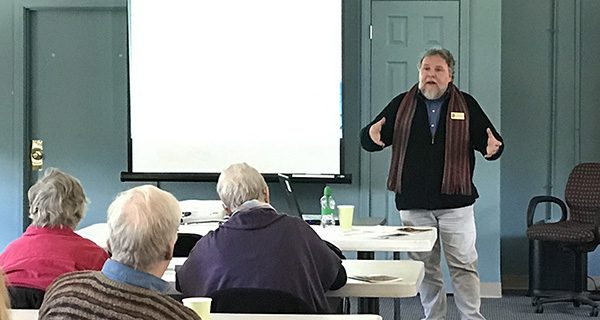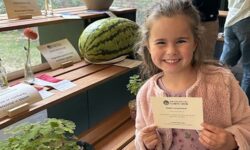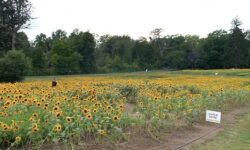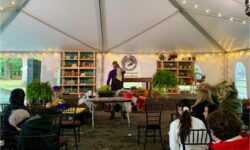By Lisa Moore
Hometown Weekly Correspondent
Wellesley Garden Study Group, Wellesley Green Schools, and Massachusetts Horticultural Society teamed up last week to present a free program about the school garden initiative. Started in the 19th century by Mass Horticultural Society, the school gardens initiative provides a wealth of educational opportunities for students and schools. John Forti, director of Horticulture and Education at Massachusetts Horticultural Society, led the discussion, sharing his depth of knowledge with the assembled group. The goal of the presentation was to educate and energize those in attendance about the benefits of having community gardens.
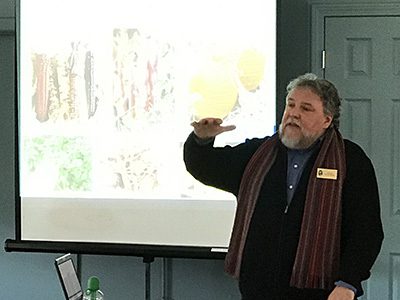
John Forti presents to the Wellesley Garden Study Group. Forti’s presentation revolved around the school garden initiative. Photo by Lisa Moore
In today’s society, most people can identify and name hundreds of corporate logos, but cannot identify 10 plants growing in their own yards. Forti hopes to help schools change that. He spoke about how school gardens can be an inroad to science, art, mathematics, and history. Students can learn from nature and learn about the history of an area by the plants that grow there. Observing the native landscape, for example, one can see evidence of what was put there before them.
Sharing some of that history, Forti spoke about the victory gardens popular during WWII and how at that time, nearly half of the nation’s produce was grown in those gardens. Today in America, we are experiencing a sort of renaissance and now have as many home gardens as we had during WWII. “Gardens have always been about growing communities and growing civilizations. Gardening enriches our lives,” said Forti.
Another important benefit of local gardens is maintaining genetic diversity. The Irish potato famine was caused by narrow genetic diversity. When the blight hit, all crops were genetically similar and most died because they could not defend against the blight. Today’s farmers markets and local gardens help to maintain biodiversity by using open pollination. With open pollination, plants breed true, resulting in seeds that will produce plants roughly identical to their parent plant. Oftentimes, individuals will save seeds from a particularly good fruit, vegetable or flower so that in years to come, they can be planted and produce more of the desired crop. When seeds are saved across generations, they are called heirloom varieties. Popular heirloom varieties include heirloom tomatoes, beans, peas, and many other garden vegetables.
Getting the youth of today to connect with nature is an important goal of local garden clubs and Wellesley Green Schools. Joining with schools to develop edible gardens can teach students about the environment and connect them to the different plants and animals that are part of the local habitats. When students feel connected, they become stewards of the environment, helping to maintain biodiversity, clean air and water, and healthy soil for future generations.
Anyone interested in becoming involved with a local school’s garden or starting one of their own may contact Susan Zelenko at susanzelenko@verizon.net, or the Wellesley Garden Study group President Liz Tecca at liz.tecca@gmail.com.
For upcoming events at Massachusetts Horticultural Society, contact Katie Folts, Education Coordinator, at KFolts@masshort.org.





